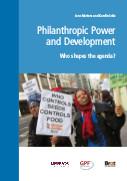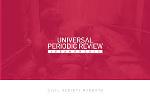Social Watch news
Published on Wed, 2016-01-06 09:33
The Thai government announced, mid-2015, a policy on child support providing grants for poor families. A monthly allowance of 400 baht per child will be given to children born between 1 October 2015 and 30 September 2016. The Ministry of Social Development and Human Security anticipates that about 135,768 new-born babies will be covered once the program is completed. Civil society wants social security to be recognised as a right and warns that the complexities of poverty and inequality in a changing society need to be better understood.
|
Published on Mon, 2015-12-21 10:24
The Paris Agreement, under the United Nations Framework Convention on Climate Change (UNFCCC), was finally adopted evening of Saturday, 12 December, after four years since the launch of the process to develop the legal instrument under the Ad hoc Working Group under the Durban Platform for Enhanced Action (ADP).
The adoption of the Agreement was heralded as "historic" by President of the 21st meeting of the Conference of Parties (COP21) to the UNFCCC, French Foreign Minister Laurent Fabius, as well as several countries that spoke at the final plenary.
|
Published on Fri, 2015-12-11 19:03
Last summer, the international civil society network Fair Finance Guide International (FFG) launched its report on Transparency and Accountability in the Financial Sector. The report examined key aspects relating to transparency and accountability, and to reporting about tax related issues, as they apply to 47 banks in the seven countries where FFG is active.
The report assessed and scored the 47 banks on their transparency and accountability by looking at four key aspects: publication of policies and risk management; disclosure of investments; reporting on engagement with companies and voting behaviour; and stakeholder dialogue. The report also scored those banks on their transparency on tax-related issues, including the extent to which they provide detailed, country-by-country information on key indicators on transparency and tax.
|
Published on Wed, 2015-12-09 18:39
Philanthropic foundations such as the Bill & Melinda Gates Foundation and the United Nations Foundation have seconded their staffers to top management positions at the World Health Organization.
A UN Foundation staffer was placed in the office of the Director-General Dr. Margaret Chan as senior strategist (D1 level) for a 24-month contract this year.
One Gates Foundation staffer is seconded at P5 level as manager of program operations and cluster management at the Polio and Emergencies Cluster.
|
Published on Fri, 2015-12-04 09:09
New study, released today by Global Policy Forum, examines the role and impact of philanthropic foundations in development. It addresses the impacts and side effects of philanthropic engagement by taking a closer look at the priorities and operations of two of the most prominent foundations, the Rockefeller Foundation and the Bill & Melinda Gates Foundation, in two crucial sectors, health and agriculture. So far, there has been a fairly willing belief among governments and international organizations in the positive role of philanthropy in global development. But in light of experiences in the areas of health, food, nutrition and agriculture, which are discussed in this working paper, a thorough assessment of the impacts and side effects of philanthropic engagement is necessary. The important role being allocated to the philanthropic sector in the 2030 Sustainable Development Agenda makes the discussion of its role a matter of urgency.
|
Published on Tue, 2015-11-24 05:53
As part of its mandate to develop an indicator framework by which to monitor the goals and targets of the post-2015 development agenda, the Inter-agency and Expert Group on SDGs (IAEG-SDGs) held its second meeting in Bangkok, 26-28 October 2015. The objective was to seek agreement on the proposed indicators for each target—keeping in mind that indicators alone can never be sufficient to fully measure progress on the goals. More specifically, it was to move provisional indicators marked yellow—needing further agreement—to either green—agreed by all parties—or grey—no agreement possible. As a result, there are now 159 green indicators (including 52 moved from yellow and 9 new ones), and 62 greys (including 28 moved from yellow plus 5 new ones).
|
Published on Wed, 2015-11-18 20:17
The investor-state dispute settlement mechanisms are incompatible with the Charter of the United Nations and Human Rights, concluded the prominent Cuban-American lawyer Alfred-Maurice de Zayas, in his report to the General Assembly of the UN as Independent Expert on the Promotion of a Democratic and Equitable International Order, appointed by the Human Rights Council.
This system, argues the expert, “should be abolished” because it is a “fundamentally flawed system having adverse human rights impacts and because its operation has upset the international order by debilitating States, encroaching on their regulatory space and aggravating inequality and inequity in the world.”
|
Published on Mon, 2015-11-16 13:59
During the 23rd Working Group session of the Universal Periodic Review the situation of human rights in Lebanon were reviewed by the UN member states. During the interactive dialogue several member states directed recommendations to Lebanese Delegation headed by Permanent Representative of Lebanon to UN Mission in Geneva Mrs. Najla Riachi Assaker on the issues of women’s rights, torture, migrant workers, establishment of a moratorium on the death penalty.
Three and a half hour session provided the occasion for both national delegation representatives and the UN Member states to shed light on the ‘extraordinary challenges’ the country is facing, namely the Syrian crisis and the terrorism in the neighbourhood. Unfortunately as civil society groups engaged in the UPR process and working on issues of human rights and development, we believe that these challenges cannot be ‘excuses’ for non-implementation of recommendations accepted back in 2010 and in overall providing maximum available resources for ensuring the full enjoyment of human rights in the country.
|
Published on Wed, 2015-11-11 15:20
After a two days meeting in Bangkok, at the end of October, the statistical experts of the UN agencies have come with a controversial list of 159 “generally agreed” indicators to measure the Sustainable Development Goals approved last September by the UN.
Traditionally, development agencies have tried to summarize in a single indicator or index complex development goals. Thus, UNICEF emphasized infant mortality as a proxy indicator of its mandate to protect children, the World Bank has traditionally equated development with per capita income, and UNDP enriched that idea with its Human Development Index based on a larger but still reduced set of indicators. Those single figures were considered to correlate so closely with other relevant indicators (for example infant mortality correlates with child underweight) that they were considered as useful to represent broad trends, progress or regression, in realities that everybody understood as being complex.
|
SUSCRIBE TO OUR NEWSLETTER
Submit

|









